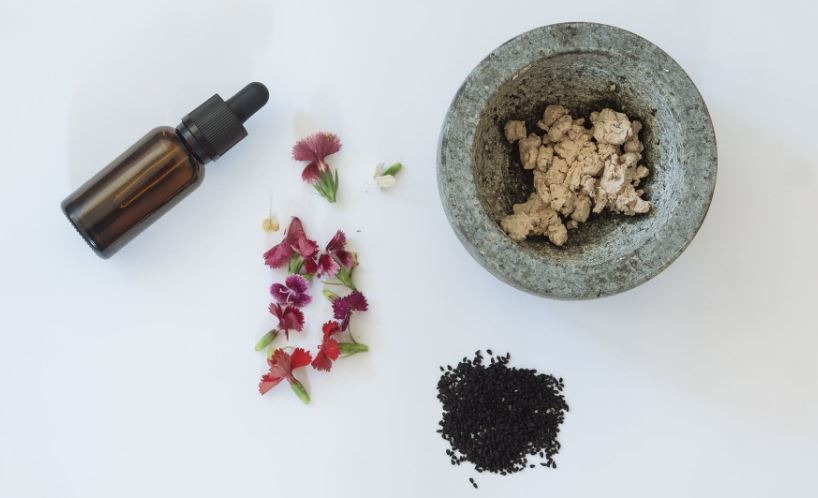When it comes to skincare, it is common knowledge that many of the most prevalent anti-aging products were tried and tested in a laboratory. While that may be fine for some—we all want to look and feel young—the idea may put others off. If the idea of smearing your face with some ingredients you can’t even pronounce (let alone understand) makes you nervous, it’s time to shift your focus to natural anti-aging skincare.
The skin loses volume on all levels as it ages. Because the cells are not as plump and round, the dermis, facial fat pads, epidermis, and facial muscles lose volume and tone.
Elastin production in the skin peaks shortly before birth and declines until the age of 40, when it ceases completely. As far as experts can tell, any elastin damage after this age is irreversible.
As a result, an effective anti-aging skincare regimen must include steps to address moisture retention and hydration, improve skin suppleness, protect against oxidative stress, and promote cell and collagen regeneration.
Why Should You Use Natural Ingredients?
Although synthetic ingredients have been shown to reduce fine lines and wrinkles, many natural alternatives provide the same anti-aging advantages without exposing the skin to toxic chemicals and preservatives. Some people believe that natural ingredients are only extracts and botanicals, but scientific advances have elevated natural ingredients to another level.
Some of these scientific advances involve ingredient fermentation and other novel processes. Natural ingredients can synergistically interact with the body, enhancing their benefits and providing healthy options to synthetic ones.
Unlike some of their lab-based counterparts, natural ingredients are also easier to absorb because the body perceives them as nutrients. They do not clog pores, aid in moisture retention, promote cell regeneration, and do not harm the immune system.
Before You Make the Leap
While going natural is certainly exciting, experts advise making the big transition gradually. Take it one step at a time. If your skin agrees, proceed to the next step in your regimen.
If you begin using all new products at once, you may be unable to determine which are effective and which may be allergenic. While using natural products is an essential step, you must work from within to achieve optimal skin.
Do you wish to slow down the aging process of your skin naturally? Please continue reading to learn more about the effective natural anti-aging skincare and what science says about them!
Greens
Here’s another reason you shouldn’t skip your vegetables! Green leafy vegetables are high in phytonutrients like zeaxanthin and lutein and tocopherols (vitamin E), which help to prevent sun damage and the signs of aging while also promoting overall skin health. Green vegetable consumption was shown in one study to reduce the appearance of fine lines and wrinkles and the risk of skin cancer.
Aside from eating green vegetables, you can also try these home remedies for wrinkles!
Berries
According to research, berries are high in polyphenols such as tannins and flavonoids, which act as antioxidants and protect against oxidative stress. These phenolic compounds have properties that aid in the treatment of skin diseases (including skin cancer), the reduction of the causal factors of skin aging, and the improvement of the appearance of scars and burns.
Flavonoids, in particular, have anti-inflammatory and antimicrobial properties, whereas tannins act as a natural astringent, tightening and shrinking skin cells.
Rosehip Seed Oil
While rosehip oil is well-known for reducing discoloration and scarring, a 2015 study that used rosehip powder suggests that it also has anti-aging properties. After eight weeks of use, the subjects reported significant improvements in skin moisture, crow’s feet, and elasticity. That’s not surprising given that rosehip is high in fatty acids and antioxidants such as carotenoids and tocopherols, making it an excellent antioxidant and anti-inflammatory ingredient.
Fruit or Plant Stem Cells
Plant- and fruit-derived stem cells are high in elastin fibers and collagen, and as we all know, the production of these key proteins declines as we age, resulting in dull, dry, and wrinkled skin. Stem cells may be the closest thing to the fabled fountain of youth we’ll ever get. They are essential in anti-aging skincare due to their capacity to self-renew—they regenerate damaged tissue and replenish cells that require repair.
Swiss apple stem cells, especially, have been discovered to protect and maintain human stem cells, resulting in a reduction in early signs of aging such as loss of firmness and fine lines.
Lactic Acid
Among the skincare industry’s most beloved ingredients, lactic acid is an AHA that occurs naturally in our bodies and typically in fermented vegetables and yogurt. It’s well-known as an anti-aging ingredient for smoothing wrinkles and improving skin elasticity and texture. This AHA is also frequently used as an exfoliant to promote skin lightening and cell regeneration.
Carrot Seed
This oil may not be on your watch list as a leading anti-aging ingredient, but it deserves to be on this list. The antioxidant carotenoid is abundant in this seed oil. It detoxifies the skin, repairs skin damage, and hydrates it.
Carrot seed oil, taken from the carrot plant Daucus carota (not to be confused with carrot oil), contains cancer-fighting bioflavonoids and free radical scavenging and antimicrobial properties.
Green Tea
Green tea (all teas, really) needs no introduction to natural ingredients. Its numerous advantages concern the human body’s overall health, including a slew of skincare wonders.
Green tea contains anti-inflammatory and antioxidant compounds. Green tea’s anti-aging properties are attributed to polyphenols, a plant flavonoid. In preliminary studies, green tea has been shown to protect skin from cancer, reduce sun damage, and slow collagen breakdown.
Coconut Oil
Coconut oil is highly beneficial for the skin and is well-known for its skin-healing, anti-aging, antifungal, and antibacterial properties. A 2010 study discovered that virgin coconut oil, distinctively, contains properties that stimulate collagen production. It’s also a powerful moisturizer, particularly beneficial for those with dry or aging skin.
Bilberry Extract
Bilberries, common in Northern Europe, have traditionally been used in folk medicine for their antibacterial, antiseptic, and anti-inflammatory properties. Bilberry is best known in modern skincare as an anti-aging treatment.
It is a natural source of anthocyanins, a phenolic substance that acts as an antioxidant, assisting in the repair of UVA-induced free radical damage of the epidermal cells and strengthening skin tissue and capillaries. Furthermore, bilberry has astringent properties that aid in skin tightening and cleansing, along with vitamins C, B, and E that hydrate and nourish the skin.

